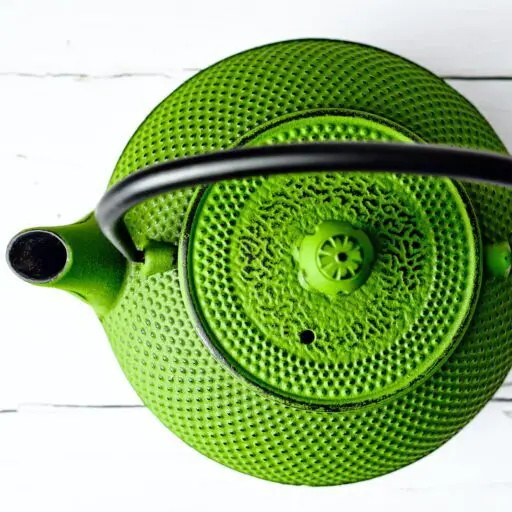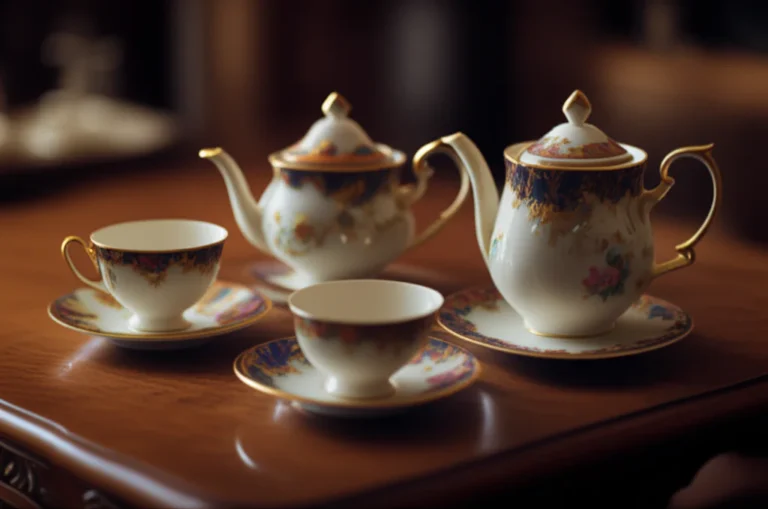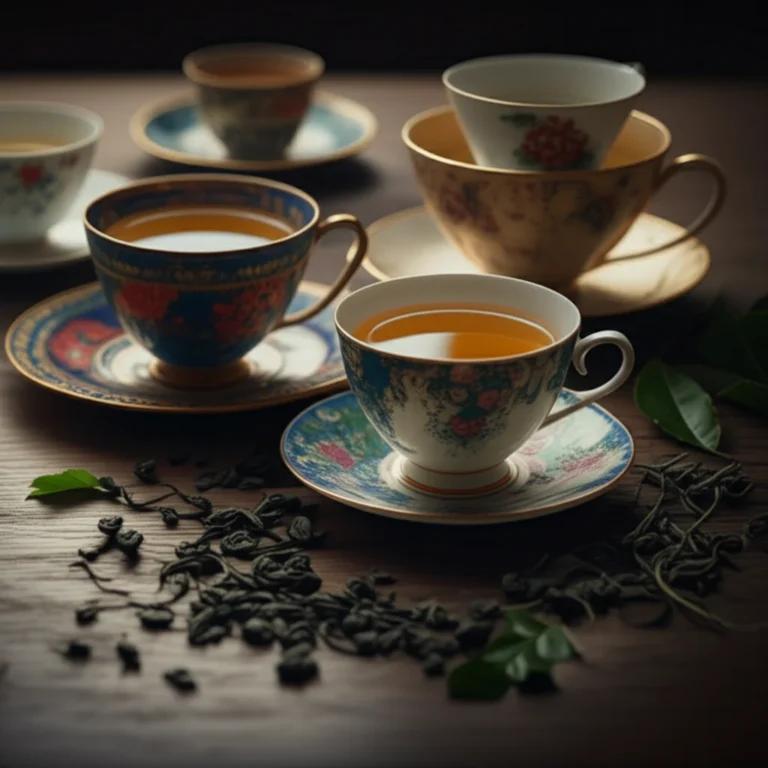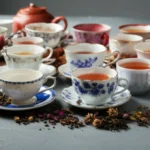Support our educational content for free when you purchase through links on our site. Learn more
12 Organic & Sustainable Tea Brands Worth Trying in 2025 🍃
Are you tired of wondering if your favorite tea brand truly cares about the planet and your health? You’re not alone. At Tea Brands™, we’ve sniffed, sipped, and scrutinized dozens of teas to uncover which organic and sustainable brands are genuinely worth your cup—and your conscience. Spoiler alert: many popular teas still hide plastic in their bags or fall short on fair trade promises. But don’t worry, we’ve brewed up a definitive list of 12 top-notch brands that blend ethical sourcing, eco-friendly packaging, and exceptional flavor.
Did you know that some tea bags release billions of microplastic particles into your cup? 😱 Later, we’ll reveal a simple home test to spot plastic tea bags and share our favorite plastic-free picks. Plus, if you’re curious about how to make your tea ritual truly sustainable beyond just the brand, we’ve got you covered with expert tips. Ready to sip smarter and greener? Let’s dive in!
Key Takeaways
- Organic tea means no synthetic pesticides or GMOs, protecting your health and the environment.
- Sustainability goes beyond organic: fair wages, ethical sourcing, and eco-friendly packaging matter.
- Many popular tea bags contain plastic that releases microplastics; switching to plastic-free brands or loose leaf is crucial.
- Our top 12 brands like Pukka Herbs, Numi Organic Tea, and Traditional Medicinals combine flavor, ethics, and sustainability.
- Embracing loose leaf tea and composting used leaves can reduce waste and enhance your tea experience.
- Ask your current tea brand about plastic usage—consumer demand drives change!
For a curated shopping experience, explore these trusted brands and make your next cup count!
Table of Contents
- ⚡️ Quick Sips: Essential Organic & Sustainable Tea Facts
- 🌿 The Roots of Change: Why Organic & Sustainable Tea Isn’t Just a Trend
- 🕵️♀️ Greenwashing or Genuine? How to Spot Truly Sustainable Tea Brands
- 🔬 The Plastic Predicament: Are Your Tea Bags Brewing Microplastics?
- 🌟 Our Top 12 Organic & Sustainable Tea Brands Worth Savoring
- 💡 Beyond the Brew: Holistic Tips for a Sustainable Tea Lifestyle
- 💖 Your Cup, Your Impact: Why Your Tea Choices Matter More Than You Think
- ✨ Conclusion: Sip Smart, Live Sustainably
- 🔗 Recommended Links for the Conscious Tea Lover
- ❓ Frequently Asked Questions About Organic & Sustainable Tea
- 📚 Reference Links: Our Sources & Further Reading
⚡️ Quick Sips: Essential Organic & Sustainable Tea Facts
Welcome to the world of organic and sustainable teas, where every sip tells a story of care—for your health, the planet, and the hardworking farmers behind the scenes. At Tea Brands™, we’ve brewed countless cups and sniffed endless leaves, and here are some key facts to get you steeped in the essentials:
- Organic Tea Means No Synthetic Chemicals: Certified organic teas are grown without synthetic pesticides, herbicides, or fertilizers, reducing environmental toxins and protecting biodiversity. Learn more about organic certification.
- Sustainability Encompasses More Than Organic: It includes fair wages, ethical sourcing, water conservation, and eco-friendly packaging.
- Plastic in Tea Bags Is a Hidden Culprit: Many popular tea bags use polypropylene to seal, releasing microplastics into your brew. (More on this later!)
- Loose Leaf Tea Is the Gold Standard: It’s fresher, less processed, and usually comes with less packaging waste.
- Fair Trade and Direct Trade Matter: They ensure farmers get fair pay and work in safe conditions.
Curious which brands truly walk the talk? Stick around—we’ll spill the tea on the best organic and sustainable brands you can trust!
For a deep dive into the best tea brands worldwide, check out our best tea brands in the world guide.
🌿 The Roots of Change: Why Organic & Sustainable Tea Isn’t Just a Trend
Tea has been a beloved ritual for centuries, but the way it’s grown and sourced is undergoing a revolution. Let’s explore why organic and sustainable tea is more than just a buzzword.
🌱 What Does “Organic” Really Mean for Your Tea? Unpacking Certifications
“Organic” isn’t just a label slapped on a box. It’s a rigorous certification process ensuring:
- No synthetic pesticides or fertilizers used on tea plants.
- Soil health and biodiversity are prioritized.
- No genetically modified organisms (GMOs).
The most recognized certifications include:
| Certification | Meaning | Where to Check |
|---|---|---|
| USDA Organic | US government standard for organic farming | USDA Organic |
| EU Organic | European Union organic farming standards | EU Organic |
| JAS (Japan Agricultural Standard) | Japanese organic certification | JAS |
| Soil Association (UK) | UK’s leading organic certifier | Soil Association |
Pro Tip: Always look for the certification logo on the packaging. If it’s missing, ask the brand or skip it.
🌍 Beyond Organic: Defining True Tea Sustainability & Ethical Sourcing
Sustainability in tea is a multi-layered concept:
- Environmental: Minimizing water use, protecting ecosystems, reducing carbon footprint.
- Social: Fair wages, safe working conditions, community development.
- Economic: Supporting smallholder farmers, avoiding exploitative practices.
Brands that practice direct trade often have closer relationships with farmers, ensuring transparency and fairness. This approach contrasts with large corporations that may obscure supply chains.
Ethical sourcing also means avoiding child labor and promoting women’s empowerment in tea-growing regions.
🕵️♀️ Greenwashing or Genuine? How to Spot Truly Sustainable Tea Brands
With sustainability becoming trendy, some brands may exaggerate their eco-credentials. How can you tell the real deal from greenwashing? Here’s our expert checklist:
📜 Key Certifications to Look For: Your Guide to Trustworthy Tea
- Fairtrade International: Guarantees fair prices and decent working conditions. Fairtrade
- Rainforest Alliance: Focuses on environmental protection and social equity. Rainforest Alliance
- Organic Certifications: As discussed earlier.
- B Corp Certification: For companies meeting high social and environmental standards. B Corp
❌ Red Flags: What to Watch Out For in the Tea Aisle
- Vague claims like “eco-friendly” or “natural” without certification.
- Lack of transparency about sourcing or suppliers.
- Overuse of buzzwords without evidence.
- Packaging that’s not recyclable or compostable.
- Brands owned by conglomerates with poor ethical records (e.g., Tata Group’s controversies).
Remember, asking questions is your superpower. Contact brands directly or check their websites for sourcing info.
🔬 The Plastic Predicament: Are Your Tea Bags Brewing Microplastics?
Here’s a shocker: many tea bags contain plastic, often polypropylene, used to seal the bags. When steeped in hot water, these plastics can release billions of microplastic particles into your cup. Yikes! Source: Center for Environmental Health.
🔍 Is Your Tea Bag Made with Plastic? A Simple Home Test
Try this quick test:
- Remove the tea bag from the box.
- Light a corner of the dry tea bag with a lighter or match (careful!).
- If it melts or shrinks, it contains plastic.
- If it burns like paper or leaves ash, it’s plastic-free.
Warning: Don’t inhale fumes from burning plastic.
✅ Brands Brewing Better: Our Picks for Plastic-Free Tea Bags
Here are some brands we’ve tested and confirmed use plastic-free tea bags or compostable materials:
| Brand | Plastic-Free Tea Bags? | Organic Certified? | Fair Trade Certified? | Notes |
|---|---|---|---|---|
| Pukka Herbs | ✅ | ✅ | ✅ | 100% compostable, vibrant blends |
| Traditional Medicinals | ✅ | ✅ | ✅ | Herbal focus, trusted for decades |
| Numi Organic Tea | ✅ | ✅ | ✅ | Direct trade, innovative packaging |
| Yogi Tea | ✅ | ✅ | ✅ | Wellness blends, plastic-free bags |
| Republic of Tea | ✅ | ✅ | ✅ | Pyramid bags made from plant fibers |
| Stash Tea | ✅ | ✅ | ❌ | Plastic-free bags, wide variety |
⚠️ Brands Still Using Plastic: Why We Need to Ask Them to Change
Unfortunately, some popular brands still use plastic-sealed bags:
- Tazo (owned by Starbucks)
- Celestial Seasonings
- Mighty Leaf Teas (Peet’s)
- Teavana (Starbucks)
We recommend reaching out to these brands to express your desire for plastic-free options. Consumer voices matter!
🍃 The Ultimate Eco-Friendly Brew: Embracing Loose Leaf Tea
Loose leaf tea is the gold standard for sustainability and quality. Benefits include:
- No plastic or paper waste from bags.
- Fresher, whole leaves retain more flavor and antioxidants.
- You control the strength and blend.
- Often packaged in recyclable or compostable containers.
How to Brew Loose Leaf Tea:
- Use an infuser, tea ball, or French press.
- Add 1-2 teaspoons of loose leaf per cup.
- Pour hot water (temperature depends on tea type).
- Steep for recommended time (2-5 minutes).
- Remove leaves and enjoy!
For more on loose leaf teas, visit our Herbal Tea and Specialty Blends sections.
🌟 Our Top 12 Organic & Sustainable Tea Brands Worth Savoring
Ready for the ultimate tea tasting? Here’s our expert-rated rundown of 12 brands that excel in organic, sustainable, and ethical tea production. We scored each on Design, Functionality, Sustainability, Flavor, and Value (scale 1-10).
| Brand | Design | Functionality | Sustainability | Flavor | Value | Overall |
|---|---|---|---|---|---|---|
| Pukka Herbs | 9 | 9 | 10 | 9 | 8 | 9 |
| Numi Organic Tea | 8 | 9 | 9 | 9 | 8 | 8.6 |
| Rishi Tea | 8 | 8 | 9 | 10 | 7 | 8.4 |
| Traditional Medicinals | 7 | 8 | 9 | 8 | 9 | 8.2 |
| Organic India | 7 | 7 | 10 | 8 | 7 | 7.8 |
| Arbor Teas | 7 | 8 | 9 | 8 | 8 | 8 |
| Choice Organic Teas | 6 | 7 | 9 | 7 | 8 | 7.4 |
| Tea Pigs | 8 | 8 | 8 | 8 | 7 | 7.8 |
| Clipper Teas | 7 | 7 | 8 | 7 | 8 | 7.4 |
| Equal Exchange | 6 | 7 | 9 | 7 | 8 | 7.4 |
| Dr. Stuart’s Botanical | 7 | 7 | 8 | 8 | 7 | 7.4 |
| Yogi Tea | 8 | 8 | 8 | 8 | 7 | 7.8 |
1. Pukka Herbs: A Symphony of Organic & Fair Trade Goodness
Design & Packaging: Beautifully designed boxes with vibrant colors and clear organic and Fairtrade certifications. Their tea bags are 100% plastic-free and compostable.
Flavor Profile: Herbal blends that are bold, aromatic, and balanced. Favorites include “Three Ginger” and “Love.”
Sustainability: Pukka is a trailblazer in sustainability, supporting regenerative farming and fair wages.
Why We Love It: Every cup feels like a wellness ritual. Plus, their transparency and activism make us proud to sip.
👉 CHECK PRICE on:
2. Numi Organic Tea: Deep Roots in Ethical Sourcing & Innovation
Design & Packaging: Elegant tins and boxes with a focus on sustainability—biodegradable tea bags and recyclable packaging.
Flavor Profile: Wide range from classic black teas to exotic blends like “Jasmine Green” and “Chai Rooibos.”
Sustainability: Direct trade relationships with farmers, organic certification, and commitment to zero waste.
Why We Love It: The perfect balance of tradition and innovation, with a conscience.
👉 CHECK PRICE on:
3. Rishi Tea: Crafting Exceptional Organic & Direct Trade Teas
Design & Packaging: Minimalist, elegant, with resealable bags to preserve freshness.
Flavor Profile: Exceptional single-origin teas and unique blends like “Jade Cloud” and “Turmeric Ginger.”
Sustainability: Direct trade certified, organic, and committed to environmental stewardship.
Why We Love It: For the tea connoisseur who demands quality and ethics.
👉 CHECK PRICE on:
4. Traditional Medicinals: Herbal Wisdom, Sustainably Sourced
Design & Packaging: Classic, medicinal-style packaging with clear organic and fair trade labels.
Flavor Profile: Herbal teas focused on wellness, like “Throat Coat” and “EveryDay Detox.”
Sustainability: Organic, fair trade, and committed to sustainable wild harvesting.
Why We Love It: Trusted for decades, their teas are a staple for health-conscious tea lovers.
👉 CHECK PRICE on:
5. Organic India: Regenerative Agriculture & Community Empowerment
Design & Packaging: Earthy, natural packaging highlighting organic and fair trade certifications.
Flavor Profile: Strong, earthy teas like “Tulsi” blends and “Chai Masala.”
Sustainability: Pioneers in regenerative agriculture and supporting Indian farming communities.
Why We Love It: Their commitment to social impact matches their flavorful teas.
👉 CHECK PRICE on:
6. Arbor Teas: Loose Leaf Pioneers with Eco-Conscious Packaging
Design & Packaging: Simple, recyclable bags and tins; focus on loose leaf.
Flavor Profile: Wide variety of organic loose leaf teas and herbs.
Sustainability: Organic, fair trade, and plastic-free packaging.
Why We Love It: Perfect for loose leaf lovers who want transparency and quality.
👉 CHECK PRICE on:
7. Choice Organic Teas: A Legacy of Organic & Fair Trade Firsts
Design & Packaging: Classic tea boxes with clear organic and fair trade labels.
Flavor Profile: Traditional blends with a focus on black and green teas.
Sustainability: One of the first to be USDA organic and Fair Trade certified.
Why We Love It: A pioneer brand that’s still delivering quality and ethics.
👉 CHECK PRICE on:
8. Tea Pigs: Great Taste, Great Ethics, No Compromises
Design & Packaging: Modern, playful packaging with biodegradable pyramid bags.
Flavor Profile: Fun, flavorful blends like “Super Fruit” and “Ginger & Lemongrass.”
Sustainability: Plastic-free bags, organic ingredients, and ethical sourcing.
Why We Love It: A fresh, vibrant brand for ethical tea lovers.
👉 CHECK PRICE on:
9. Clipper Teas: Natural, Fair & Deliciously Ethical
Design & Packaging: Simple, recyclable packaging with clear certifications.
Flavor Profile: Classic teas with a natural, unadulterated taste.
Sustainability: Organic, Fairtrade, and plastic-free tea bags.
Why We Love It: A no-nonsense brand with a strong ethical backbone.
👉 CHECK PRICE on:
10. Equal Exchange: Farmer-Owned, Fairly Traded, Always Organic
Design & Packaging: Earthy, farmer-focused branding.
Flavor Profile: Robust, straightforward teas with a focus on social justice.
Sustainability: Farmer-owned cooperative, organic, and Fair Trade certified.
Why We Love It: Supporting farmers directly with every cup.
👉 CHECK PRICE on:
11. Dr. Stuart’s Botanical Teas: Expertly Blended, Ethically Sourced
Design & Packaging: Apothecary-style, focusing on herbal and botanical blends.
Flavor Profile: Unique blends like “Calm” and “Digestive Aid.”
Sustainability: Organic ingredients, ethical sourcing, and plastic-free packaging.
Why We Love It: Perfect for those seeking functional, wellness teas.
👉 CHECK PRICE on:
12. Yogi Tea: Inspiring Wellness with Organic & Sustainable Practices
Design & Packaging: Iconic, colorful boxes with inspirational messages.
Flavor Profile: Classic wellness blends like “Honey Lavender Stress Relief.”
Sustainability: Organic, Fair Trade, and plastic-free tea bags.
Why We Love It: A household name that balances tradition and sustainability.
👉 CHECK PRICE on:
💡 Beyond the Brew: Holistic Tips for a Sustainable Tea Lifestyle
Sustainability doesn’t stop at the tea bag. Here’s how to make your entire tea ritual greener:
💧 Water Wise: Brewing Responsibly & Conserving Resources
- Use just enough water to steep your tea—no need to overfill.
- Reuse tea leaves for a second, lighter brew.
- Collect leftover water for plants (once cooled).
♻️ Compost Your Way to a Greener Planet: What to Do with Used Tea Leaves
- Compost used tea leaves and paper tea bags (if plastic-free).
- Avoid composting plastic-containing bags to prevent contamination.
- Add tea leaves to your garden soil for natural fertilizer.
🛍️ Supporting Local & Independent Tea Purveyors
- Seek out local tea shops or small-batch producers.
- Attend tea tastings or workshops to deepen your appreciation.
- Buying local reduces carbon footprint and supports community.
💖 Your Cup, Your Impact: Why Your Tea Choices Matter More Than You Think
Every cup you sip is a vote for the kind of world you want:
- Choosing organic and sustainable teas helps reduce pesticide pollution and protects biodiversity.
- Supporting fair trade and direct trade empowers farmers and communities.
- Avoiding plastic tea bags reduces microplastic pollution and landfill waste.
- Embracing loose leaf tea enhances flavor and cuts packaging waste.
So next time you brew, remember: your tea is more than a drink—it’s a small act of global stewardship. Ready to make your next cup count?
✨ Conclusion: Sip Smart, Live Sustainably
After steeping ourselves in the world of organic and sustainable teas, here’s the takeaway from your friendly Tea Brands™ tasters:
Positives:
- Choosing organic and Fair Trade certified teas supports healthier ecosystems and fair livelihoods.
- Brands like Pukka Herbs, Numi Organic Tea, and Traditional Medicinals offer outstanding flavor, ethical sourcing, and plastic-free packaging.
- Switching to loose leaf tea or plastic-free tea bags dramatically reduces microplastic pollution.
- Supporting smallholder farmers and direct trade brands fosters transparency and social justice.
Negatives:
- Some popular brands still use plastic in their tea bags, which can release microplastics into your cup.
- Truly sustainable teas often come at a premium price, reflecting the real cost of ethical production.
- Greenwashing remains a challenge—always verify certifications and transparency.
Our Confident Recommendation:
For the best balance of taste, ethics, and sustainability, we wholeheartedly recommend starting your journey with Pukka Herbs or Numi Organic Tea. If you’re ready to embrace the ultimate eco-friendly ritual, switch to loose leaf teas from Arbor Teas or Rishi Tea. And don’t forget to ask your current favorite brands about their plastic usage—your voice matters!
Remember the question we teased earlier about whether your tea bag contains plastic? Now you know how to test it and which brands to trust. So go ahead, brew that perfect cup with confidence, knowing you’re making a positive impact—one sip at a time. ☕🌿
🔗 Recommended Links for the Conscious Tea Lover
- Pukka Herbs: Amazon | Pukka Official Website
- Numi Organic Tea: Amazon | Numi Official Website
- Rishi Tea: Amazon | Rishi Official Website
- Traditional Medicinals: Amazon | Traditional Medicinals Official Website
- Organic India: Amazon | Organic India Official Website
- Arbor Teas: Amazon | Arbor Teas Official Website
- Choice Organic Teas: Amazon | Choice Organic Official Website
- Tea Pigs: Amazon | Tea Pigs Official Website
- Clipper Teas: Amazon | Clipper Official Website
- Equal Exchange: Amazon | Equal Exchange Official Website
- Dr. Stuart’s Botanical Teas: Amazon | Dr. Stuart’s Official Website
- Yogi Tea: Amazon | Yogi Official Website
Recommended Books on Organic and Sustainable Tea
-
The Story of Tea: A Cultural History and Drinking Guide by Mary Lou Heiss & Robert J. Heiss
Amazon Link -
Tea: History, Terroirs, Varieties by Kevin Gascoyne, Francois Marchand, et al.
Amazon Link -
The Tea Book: All Things Tea by Louise Cheadle & Nick Kilby
Amazon Link
❓ Frequently Asked Questions About Organic & Sustainable Tea
What makes a tea brand truly organic and sustainable?
A truly organic and sustainable tea brand:
- Grows tea without synthetic pesticides, herbicides, or GMOs, verified by certifications like USDA Organic or Soil Association.
- Practices environmental stewardship, including water conservation, soil health, and biodiversity protection.
- Supports fair wages and safe working conditions for farmers, often through Fairtrade or direct trade.
- Uses eco-friendly packaging, avoiding plastics and promoting compostability or recyclability.
- Maintains transparency about sourcing and supply chains.
Why it matters: These practices protect ecosystems, improve farmer livelihoods, and reduce your exposure to harmful chemicals.
Which organic tea brands have the best flavor profiles?
Flavor is subjective, but among organic brands, these stand out:
- Rishi Tea: Known for exceptional single-origin and artisanal blends.
- Pukka Herbs: Vibrant herbal blends with bold, balanced flavors.
- Numi Organic Tea: Classic and exotic blends with freshness and depth.
- Traditional Medicinals: Herbal teas focused on wellness with soothing profiles.
Tip: Loose leaf teas generally offer more complex and fresher flavors than bagged teas.
How can I verify if a tea brand is sustainably sourced?
- Look for third-party certifications: Fairtrade, Rainforest Alliance, Organic.
- Check the brand’s website for supplier transparency and sourcing stories.
- Contact the brand directly to ask about their sustainability policies.
- Read independent reviews and reports, such as those from Ethical Consumer.
- Perform a simple test to check if tea bags contain plastic (see our plastic tea bag test above).
What are the benefits of choosing organic and sustainable teas?
- Healthier for You: Reduced exposure to pesticides and chemicals.
- Better for the Environment: Less pollution, healthier soils, and biodiversity conservation.
- Supports Ethical Farming: Fair wages, safer working conditions, and community development.
- Higher Quality: Often fresher, more flavorful teas with better aroma and antioxidant content.
- Reduces Plastic Pollution: Choosing plastic-free bags or loose leaf reduces microplastic contamination.
How do I transition from conventional to sustainable tea without breaking the bank?
- Start by trying one or two trusted organic brands like Pukka or Traditional Medicinals.
- Experiment with loose leaf teas in small quantities.
- Look for bulk or sampler packs to reduce cost per cup.
- Support local tea shops or co-ops that may offer affordable sustainable options.
- Remember, investing in quality and ethics pays off in flavor and peace of mind.
📚 Reference Links: Our Sources & Further Reading
- Center for Environmental Health: Plastic in My Tea Bag?
- Ethical Consumer: Tea Shopping Guide
- USDA Organic Certification: USDA Organic
- Fairtrade International: Fairtrade
- Rainforest Alliance: Rainforest Alliance
- Soil Association: Soil Association
- Pukka Herbs Official Site: pukkaherbs.com
- Numi Organic Tea Official Site: numitea.com
- Rishi Tea Official Site: rishi-tea.com
- Traditional Medicinals Official Site: traditionalmedicinals.com
For further insights on ethical tea consumption and brand ratings, visit Tea | Ethical Consumer.
Happy sipping, and may your tea journey be as rich and rewarding as the leaves themselves! 🍵🌱






